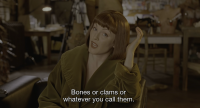




I wish I could meet one person who dislikes The Big Lebowski. I want to probe their mind, their background. What have they got against this film, this story? Well, one typical charge against the Coen Brothers and their work – that they hate their characters – is refuted definitively in J. M. Tyree and Ben Walters’s book on the film, the second edition of which has just been published in the BFI Film Classics series (the first one came out in 2010).
It took to people to write one book on the film written and directed by two brothers. But it pays off, as their book is as rich in reference, wit, and style as the movie itself. [On delightfully re-viewing the film for this review, I noticed this time that there is even a zoom at one moment.] Just as one can watch The Big Lebowski over and over, so is one excited about reading their book again and again.
Like all their films, The Big Lebowski is at root about storytelling. Barton Fink, for example, begins with the ropes and backdrops found backstage as if to announce that we are going to be shown the inner workings of narrative, and concerns a pretentious writer unable to create dreck. The Big Lebowski is ostensibly narrated by an insider, but it turns out to be someone who keeps losing his train of thought. As the two authors remind us, words are important to the story, such as the way th Dude picks of phrases here and there, and they also show that other characters do it, too. Here they are on Maude’s style of speaking:
"Conversely, Maude, though highly articulate, repeatedly finds herself aping a strange version of the vernacular – ‘the parlance of our times’ – referring to dollars as ‘bones or clams or whatever you call them’, as if holding the offending vocabulary at arm’s length between pinched fingernails (page 37).
The are also good at capturing the signatures of other Coen films, as when they refer in passing to "Fargo’s snowy nothings (page 18).
In the book’s new intro, they address the film’s continuing legacy, and reveal whence the name Lebowsky derives. Then in the book proper they move on to Lebowski fandom, then to Magpiesim, which assesses the film’s trailers, the Coens’ knack for contrasting absurdities, clothes, and where the characters come from. The next chapter compares the film to Raymond chandler novels and adaptations, and even a previous Jeff Bridges film, Cutter’s Way, while the following chapter “interrogates,” as the boys and girls in the quarterlies put it, the film’s concern with manhood, a major theme announced as early as the credit music. Finally in the concluding chapter they take on critics who attack supposed Coen heartlessness by re-examining their work under the rubric of the religion of laughter.
The best DVD currently is Universal’s 20th anniversary edition with numerous making-of docs that take on subjects such as the film’s music and dream sequences along with a lot of really fun stuff.
The best part of the book’s many good parts is the chapter on how the film interacts with Hawks’s The Big Sleep and Altman’s The Long Goodbye. One imagines one brother saying to the other, “We sure have heard a lot of crazy stories here in L A from our friends. We should put them all in a movie.” “Yeah, and we could do a parody of the private eye genre and Chandler’s stories.”
The book also helps the reader understand other Coen brother movies. I’ve always had difficulty understanding A Serious Man, but now I realize that every Coen film has a “serious man” in it, a hapless figure who humorlessly glides to his destruction, here being Donnie, Steve Buscemi’s character.
However I wish that between the first and this second edition the authors had corrected on page 43 the one typo I noticed, dating the 1947-released Kiss of Death as appearing in 1957, the year that star Richard Widmark released his 27th and 28th films.
Also I wish all these BFI scholars would do their homework. They keep calling the genre Neo-noir or nouveau noir, when the The Big Lebowski falls clearly into the genre of film soleil, as described in my 10-year-old book with a small print run, Film Soleil, from Pocket Essentials, London, England.
One final question. How does Sam Elliott’s narrating stranger know this story? He is only there for a small part of it in the bowling alley, but he also seems to be observing from on high. One of the many mysteries still waiting explication in this greatest of all comedies.


